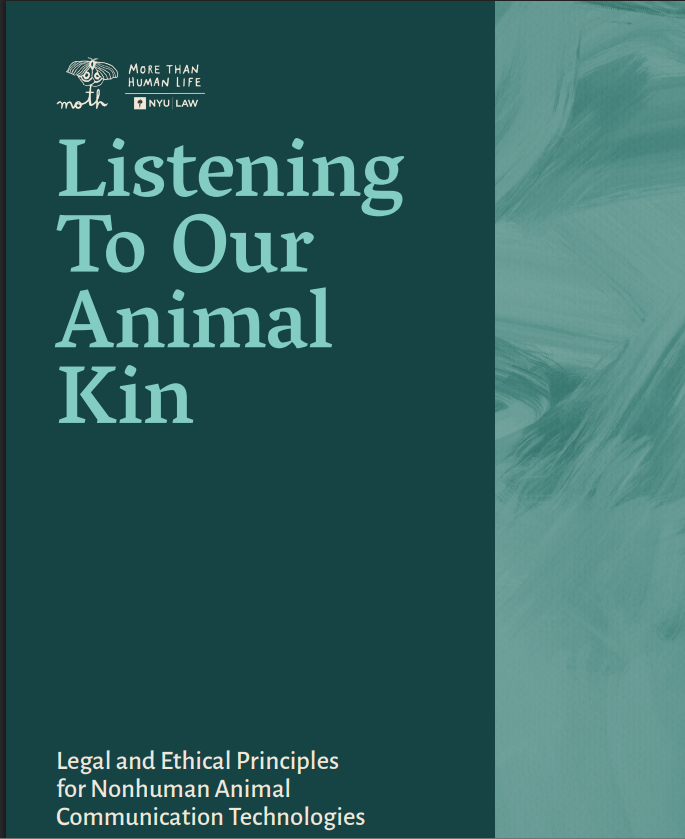Before Monkeys Fly & Elephants Cry: Protecting Wild-Kin from "Help"
- Laura A. Weber

- Nov 20, 2025
- 4 min read

From Elphaba's flight deck, defying gravity comes at a high cost, especially for her famed winged monkeys. It's a defining moment in the story. Elphaba, the so-called "Wicked" Witch, filled with compassion and moral outrage for the animals of Oz who are being maltreated at the behest of the Wizard, realizes that her magic has inadvertently caused them excruciating pain and suffering.
In a moment of panic to reverse the levitation spell, she cries: "He's in pain! Quick, tell me how to reverse it! How do I reverse it?" To which her duplicitous mentor replies: "A spell from the Grimmerie can never be reversed!" Madame Morrible is lying, of course. We can always seek ways to remediate suffering; responsive care is only one way to show compassion. Not causing suffering in the first place is another.
The lesson in "Wicked" is not lost on research biologists who study more-than-human animals for the advancement of knowledge, and advocates who collate and disseminate information to benefit and protect them. Scientists may inadvertently cause harm through technologies used to observe and integrate new information. The same goes for environmental advocates as we utilize critical research to protect our creature-kin. When we try to "help" them, they may suffer the consequences of our good intentions.
A recent study by NYU Law's MOTH (More Than Human Life) Program, "Listening to Our Animal Kin: Legal and Ethical Principles for Non-Human Animal Communication Technologies" has elucidated ethical principles that are meant to serve those engaged in research and advocacy. From the introduction:
"Nonhuman animal communication technologies (NACTs)—tools and systems that use artificial intelligence, machine learning, and advanced robotics to record, analyze, and potentially translate animal communications—represent a rapidly emerging field with profound implications for human–nonhuman relationships. While these technologies hold extraordinary promise for conservation, wildlife protection, and deepening our understanding of the more-than-human world, they also pose serious risks to animal welfare, autonomy, and ecological integrity." (Source)

At a recent MOTH webinar, research panelists shared professional anecdotes of "serious risks to animal welfare" that the proposed ethical principles might address or alleviate. One story that has stayed with me is elephant grief research that used a sound recording of a deceased elephant planted in a thicket. Elephants are studied diligently for their demonstrable patterns and rituals of grief, a marked characteristic that has interested researchers all over the planet. In this case study, the digitized voice of an elephant who had died was immediately recognized by the surviving elephant family, who reacted with pronounced distress and trumpet calls. The elephants kept frantically searching around in the thicket for the source of their lost member's voice - a daughter elephant calling out in one case for days - in a disturbing display of upset and unrest. In this case, the researchers stopped playing the recording once they recognized the severe distress their methodology was causing.
The example suggested a more compassionate method of study - one that didn't cause further distress to our wild-kin - was indicated. It meant listening better, more closely, more carefully, more fully. Just listening. Even if the sound is silence.
Elephant advocate, Joyce Pool, co-founder of Elephant Voices, lamented, “It is their silence that is most unsettling. The only sound is the slow blowing of air out of their trunks as they investigate their dead companion. It’s as if even the birds have stopped singing.” (Source)
What can we learn?

If, as the 9th MOTH principle suggests (#9 - Autonomy) - More-than-human animals should retain their autonomy to be viewed and treated as Subjects, not Objects, and to respect their rights to be left alone - then we have quite a way to go to change human perception and our technologies that frame our well-intentioned "help."
We can start small.
In our own homes, backyards, and public natural settings, we might:
Pay attention to habitat protection, refraining from pollution to soil, water, and air, and finding ways to remediate polluted habitat.
Practice a posture of humility and silent listening, limiting human-generated noise that adversely affects animal communication and echolocation.
Reduce or eliminate excessive artificial night-light that compromises nocturnal hunting and breeding habits.
Journal, sketch, record, or photograph from a safe distance, allowing room for our kin to breathe, forage, communicate, make their dens, nests, and webs without interference and proscription.
Read everything available from curated research about our kin who intrigue, attract or repel us before we take actions to "help" or dissuade them.
Refrain from feeding wild-kin in urban settings to promote their natural survival skills, resiliency, mutual protection, and autonomy.
Pay attention to behaviors and subtle or not-so-subtle cues of pain and discomfort that direct us to stop what we're doing and course-correct - maybe even leaving our kin to their own rhythm, pursuits, and direction.

Paying attention - listening - is where it all begins. From Elphie's spell with unintended harm, to the devastation caused observing elephant grief, to MOTH principles for compassionate care and ethical protection of our wild-kin, the Story is shifting in how we view and treat the wider "We." Our wild-kin are subjects, not objects. They require us to listen carefully.
Before monkeys fly.





Comments